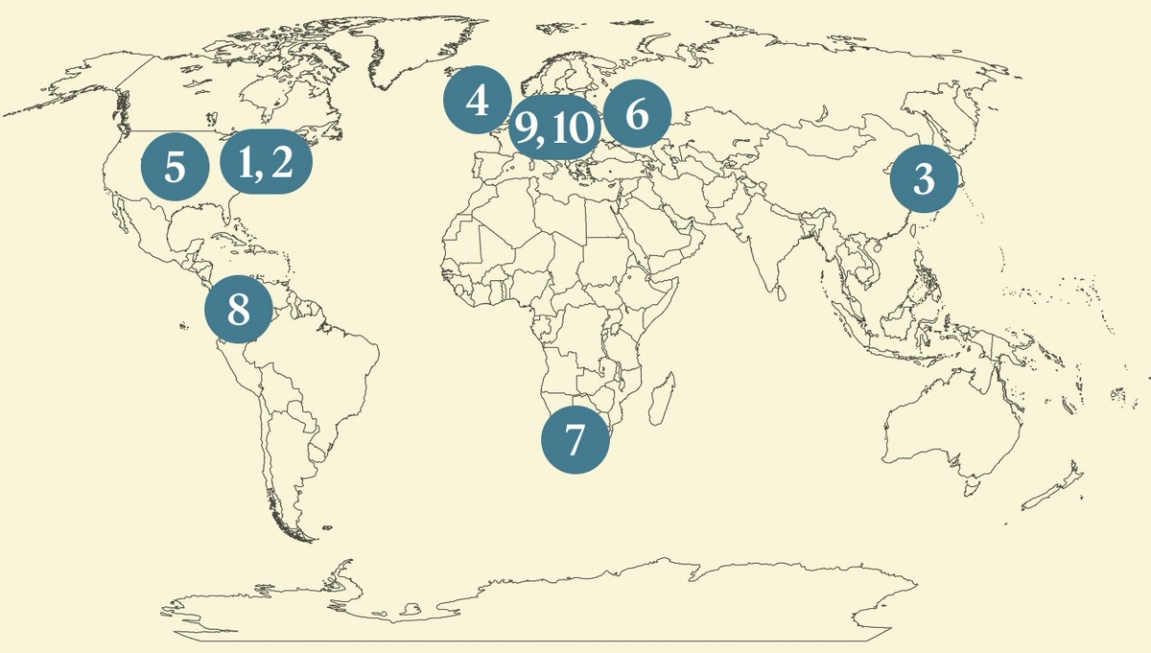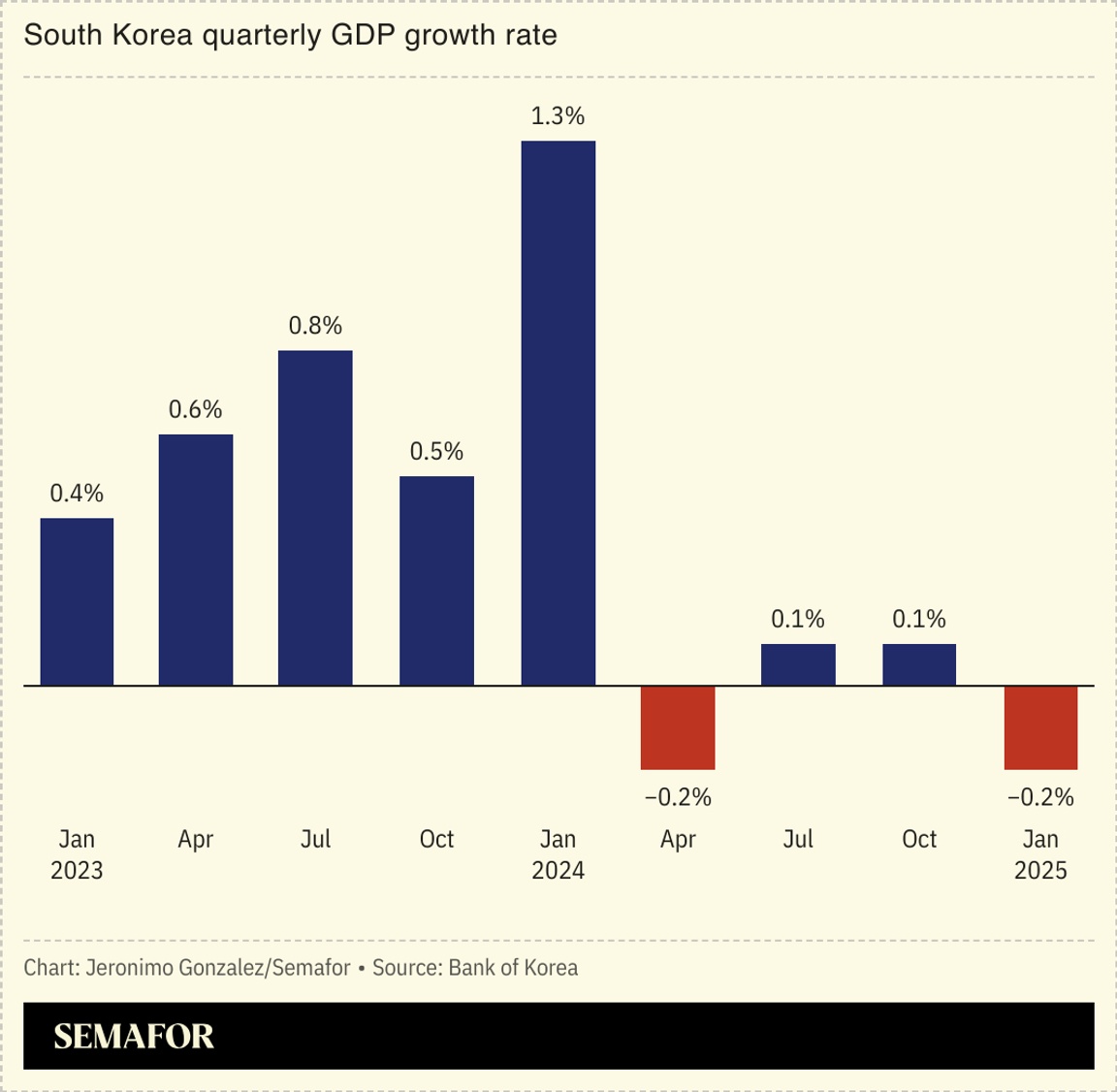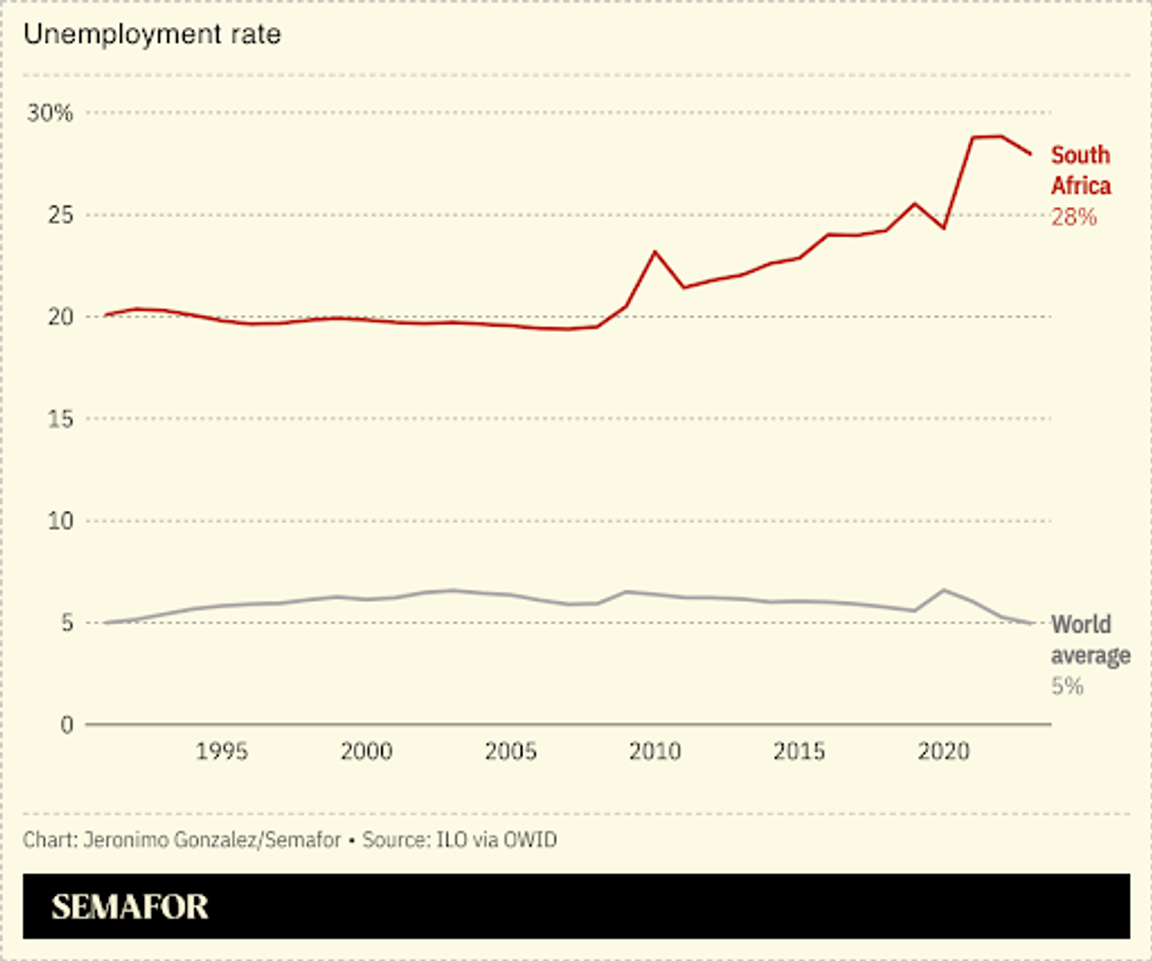| | The White House considers scaling back tariffs, industry figures call for the US to win the AI race,͏ ͏ ͏ ͏ ͏ ͏ |
| |  | Flagship |  |
| |
|
The World Today |  - Trump weighs tariff cut
- US ‘must win’ AI race
- SKorean economy shrinks
- UK’s Atlantic balancing act
- Trade war health care fears
- Major drone strike on Kyiv
- SAfrica drops tax increase
- Colombia president ‘addict’
- German arms firms boost
- Denmark-Germany tunnel
 Twenty years of YouTube, and recommending a ‘blood-soaked guilty pleasure’ of a vampire movie. |
|
US readies tariff rowback |
 Elizabeth Frantz/Reuters Elizabeth Frantz/ReutersThe Trump administration is reportedly considering scaling back punishing tariffs that have roiled markets for weeks. Among the policies being discussed are slashing duties on Chinese goods from 145% to a tiered approach starting at 35%, The Wall Street Journal reported, while the Financial Times said the US would exempt car parts from otherwise-onerous tariffs on automakers. The rowback has been driven by plummeting markets as well as corporate frustration: Tariffs have been cited in more than 90% of first-quarter earnings calls, while “recession” was mentioned in nearly half. China has taken notice, with one Beijing-based expert noting “a significant discrepancy between [US trade policy’s] actual outcomes and its initial goals.” |
|
AI race is ‘mission-critical’ |
  Evan Spiegel. Shannon Finney/Getty Images for Semafor. Evan Spiegel. Shannon Finney/Getty Images for Semafor.The US must double down on efforts to win the artificial intelligence race with China, top American executives said at Semafor’s World Economy Summit. Snap’s Evan Spiegel argued succeeding on AI was “mission-critical,” while Andreessen Horowitz’s Anjney Midha said simply: “We must win.” The US and China have taken different tacks when it comes to their advancement of AI: A major American think tank argued Washington should press for overall “technological superiority” because opportunities for the superpowers to cooperate on AI were “highly limited.” China, by contrast, is focusing on everyday and short-term business uses for AI rather than raw technological progress, the managing director of The Asia Group consultancy argued. |
|
SKorea GDP unexpectedly shrinks |
 South Korea’s economy shrank in the first quarter, an early casualty of Washington’s protectionism. The year-on-year contraction was the country’s first since late 2020, and though analysts noted domestic political turmoil likely dampened consumption, South Korea’s export-dependent economy left it vulnerable to US President Donald Trump’s fast-changing trade policies. Officials from Seoul are in Washington today hoping to win some long-term respite: Though the White House has suspended its “Liberation Day” tariffs, South Korea, the fourth largest exporter of steel to the US, is still subject to 25% tariffs on the metal. Goldman Sachs said it was downbeat on South Korea’s growth prospects, however, “given still elevated uncertainties with US tariff policy.” |
|
UK walks tightrope with EU, US |
|
Tariffs to hit medical devices |
 SEM Creative Commons Photo SEM Creative Commons PhotoHealth care firms warned that US tariffs could lead to a medical supply-chain crunch and higher prices around the world. Many high-tech medical devices contain parts from dozens of countries, and regulatory requirements make finding new suppliers difficult even for simple items such as surgical gloves. Industry groups called for tariff exemptions: A trade war “could lead to substantial cost increases for US health care providers and patients alike,” one analyst said. The US is particularly reliant on China for cheap, generic pharmaceuticals: Two industry figures wrote in The Wall Street Journal that Washington should rapidly boost its homegrown manufacturing to avoid a shortage of “antibiotics, antivirals and other lifesaving medicines” in the event of conflict with China. |
|
Russia strikes Kyiv as peace talks falter |
 Gleb Garanich/Reuters Gleb Garanich/ReutersRussia mounted the deadliest attack on the Ukrainian capital in months, while peace talks appeared to be faltering. At least nine people were killed and 80 injured as drones and missiles struck four districts in Kyiv, and the city’s mayor said more people may be trapped under rubble. The aerial barrage came hours after US President Donald Trump accused Ukrainian President Volodymyr Zelenskyy of harming peace negotiations after he refused to recognize Russia’s 2014 annexation of Crimea. The US has insisted that Ukraine must make territorial concessions in order to reach a ceasefire, and planned talks between top European, US, and Ukrainian diplomats were postponed yesterday after Kyiv rejected the US’ “final offer.” |
|
SAfrica abandons VAT plan |
 South Africa abandoned plans to increase its value-added tax, after a proposed hike threatened to break up the country’s governing coalition. The pro-business Democratic Alliance, the second-biggest member of the ruling alliance, had challenged the tax rise in court and opposed its inclusion in the budget, which the African National Congress only passed with the help of smaller parties. Though the U-turn points to the DA’s apparent political strength, South Africa’s finance minister warned that scrapping the hike could have a significant toll on Pretoria’s finances: South Africa, which has one of the world’s unemployment rates, faces huge economic challenges, exacerbated by a diplomatic and trade standoff with Washington. |
|
 Business as usual no longer works — today’s challenges are moving too fast. AI is redrawing entire industries. Economic volatility is rising, and long-established trade patterns are fracturing. To make sense of this moment, we convened some of the world’s sharpest minds to create The Semafor View — a new annual guide for navigating global uncertainty. This year’s edition breaks down the businesses, policies, and technologies reshaping the global economy. |
|
|